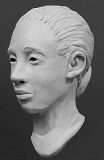
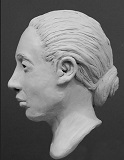
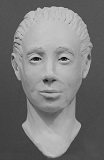
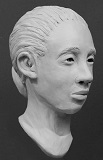
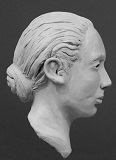
Artistic rendering by the New York Academy of Art.






Artistic rendering by the New York Academy of Art.
Date of Discovery: May 15, 1935
Location of Discovery: Middlebury, Addison County, Vermont
Estimated Date of Death: 1932 to 1934
State of Remains: Not recognizable - Near complete or complete skeleton
Cause of Death: Homicide by gunshot wound to the head
Estimated Age: 35-45 years old
Race: White
Gender: Female
Height: 5'1" to 5'3"
Weight: Unknown
Hair Color: Unknown, possibly dark-haired.
Eye Color: Unknown
Distinguishing Marks/Features: Possibly right-handed.
Dentals: Available. A number of dental fillings; mottled teeth.
Fingerprints: Not Available.
DNA: Available.
Clothing: Unknown
Jewelry: Unknown
Additional Personal Items: Pearl buttons (similar to those used on pajamas at the time), feathers (possibly from a pillow), rope fragments, a blanket, and a green and buff-colored canvas awning with wheel pulleys still attached. A copper jacketed .38 caliber bullet was found under or in her skull, most likely from a Colt automatic.
On May 15, 1935, the skeletal remains of three persons were found off of a remote, old, logging road leading to the Brookins/Blackmer hunting camp in East Middlebury, Vermont. A woman named Grace Dague and her daughter, Inez Perry Masterson, were looking for flowers in the forest when they stumbled upon the skeletal remains of the three murder victims. The victims had been there for some time; a small tree root, about a 1/2 - 3/4" thick, had grown over the leg of one of the victims. Each victim had been killed with a shot to the head. It is suspected that they were dumped in that location as far back as November 1932, based on the testimony of Edward Munso, who was hunting in the area and "missed his deer because just then he detected a terrible odor," but didn't investigate further.
The location recently has been identified as off of Burnham Drive, a road that did not exist at the time. The three skeletons found together were of a female, age 35 to 45, a juvenile teen age 13 to 15, and a child age 9 to 11. The DNA of the middle child and the adult female (despite being listed as "insufficient") suggested a parent-to-child relationship, whereas this victim's DNA could not be analyzed. However, they are believed to be related to one another.
Harvard anthropologists George Woodbury and Earnest A. Hooton suspected at the time that the victims were of Armenian descent with "skillful and costly dental work." The anthropologists also wrongly thought that this was the remains of a Mrs. Cora Golden and her two children who were missing from Milton, Vermont in 1923. Instead, Mrs. Golden and her son had run off with a local farmhand, Joseph Carter, and started a new life. Her daughter had been discovered with an adoptive family in Hartford, Connecticut.
Agency Name: Vermont State Medical Examiner's Office
Agency Contact Person: Steven Shapiro
Agency Phone Number: (802) 863-7320
Agency E-Mail: N/A
Agency Case Number: 15MB000503
NCIC Case Number: Not entered
NamUs Case Number: 13505
NCMEC Case Number: 1244456
NamUs
NCMEC
Sun Community News
NCMEC: The Art of Forensics at the New York Academy of Art (YouTube)
The Harvard Crimson (1/6/38)
The Burlington Free Press (10/30/16)
Hutchinson News Herald (12/17/50)
Bluefield Daily Telegraph (12/16/50)
Added: 2/14/15; Last Updated: 7/22/17
Questions or comments? Please contact appropriate member of the Area Team
** Listed information may be estimated.
Return Home